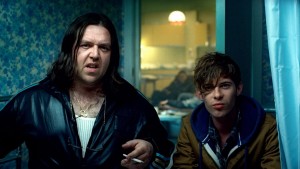I WONDER WHERE THE WONDER WENT By Richard Crouse
 George Lucas said it brought a tear to his eye, describing it as “one of those moments in history, like the invention of the light bulb or the first telephone call.” Weepy George isn’t talking about the cure for cancer or the map of the human genome. No, the waterworks tuned on at the sight of the test footage of the computer generated dinosaurs created for Jurassic Park, the film that for better and for worse ushered in an era of reliance on computer generated images.
George Lucas said it brought a tear to his eye, describing it as “one of those moments in history, like the invention of the light bulb or the first telephone call.” Weepy George isn’t talking about the cure for cancer or the map of the human genome. No, the waterworks tuned on at the sight of the test footage of the computer generated dinosaurs created for Jurassic Park, the film that for better and for worse ushered in an era of reliance on computer generated images.
Of course filmmakers have been using computers to manipulate film imagery at least as far back as 1973’s Westworld, the Yul Brenner movie which exposed audiences to the first 2D computerized images, but this photo realistic dinosaur was unlike anything anyone had seen before.
It was exciting, a giant leap forward, and I think, one of the worst things to happen to the film industry since Odor-Rama. It ushered in an anything-is-possible epoch, which gave us The Matrix’s uber-cool bullet time effects, the Toy Story movies and Alien Resurrection’s unsettling accelerated aging of Ripley’s clone.
Striking images every one, but I couldn’t help but think, as I ho-hummed my way through this weekend’s Green Lantern, a movie painted head to toe by unnecessary computer technology—did Ryan Reynolds’s silly little green mask REALLY need to be computer generated?—that the “wow” phase of computer manipulation is over.
We’ve become so used to seeing the impossible on screen that our collective sense of wonder has been eroded away. Look Ryan Reynolds can fly. Who cares? Look Jim Carrey is dancing with penguins. Yawn. Those scenes are simply a collection of binary codes banged together, and because we know there’s nothing real about the action it fails to amaze us.
The main perpetrators of CGI overkill are blockbusters, the silly season movies like the upcoming Transformers: Dark of the Moon. But even director Michael Bay, no stranger to digital trickery, seems to realize that less is more. For sure the movie will be a CGI-fest, but one spectacular set piece features people base jumping off the Sears Tower and gliding through the streets of Chicago for real.
The most exciting images I’ve seen on screen in recent years haven’t been generated via computer algorithms.
The car chase from Death Proof worked because stunt woman Zoë Bell actually hung on for dear life to the hood of a 1970 Dodge Challenger as it careened around the back roads of Lebanon, Tennessee. The real danger translated into excitement.
Christopher Nolan, director of the Batman series, doesn’t like CGI and avoids it whenever possible. His Inception has a fair amount of computer work but the most memorable scene is Joseph Gordon-Levitt’s MC Eischeresque gravity defying fight scene. It was shot on a rotating stage without enhancement and it is a mind blower.
In July Attack the Block, a low budget English stunner of an aliens attack film, opens complete with old school ETs—actors in furry suits resembling the lovechild of a gorilla and a bear with glowing green teeth—which really deliver thrills and chills.
So here! here! to filmmakers who understand audiences recognize when something authentic and organic is happening in front of them. Mazel tov to those trying to bring back the human touch to the big screen.
Dry your eyes George, we shouldn’t shed any tears at the end of overwhelming CGI in movies.
